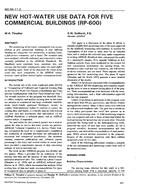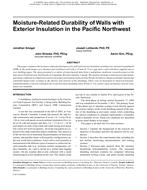Several low-cost ventilation systems, intended to meet the continuous-ventilation requirements specified in the Canadian residential ventilation standard, CSA F326, were investigated. Eight ventilation configurations were installed, commissioned, and tested in the field to obtain operating experience with the systems and to establish confidence in the simulation software. Carbon dioxide and formaldehyde levels were simulated in houses with several different ventilation system configurations. The cases modelled included houses with and without forced-air recirculation systems, average and tight building envelopes, and average and heavy occupancies. It was determined that several low-cost techniques, including fan-driven limited-distribution systems combined with one or more exhaust fans, can be effective in providing good indoor air quality control, while some other techniques should not be relied on. Examination of continuous CO2 measurements in two mechanically ventilated houses suggested that the fresh air supply rates specified by CSA F326 provide good control of this contaminant.
KEYWORDS: Canada, domestic, ventilation, standards, continuous operation, carbon dioxide, formaldehyde, calculating, housing, forced convection, recirculating, air quality, indoor, controls, mechanical ventilation, supply air ventilation, costs, testing
Citation: Symposium, ASHRAE Trans. 1991, vol.97, part 2
Product Details
- Published:
- 1991
- File Size:
- 1 file , 1.2 MB
- Product Code(s):
- D-18332


